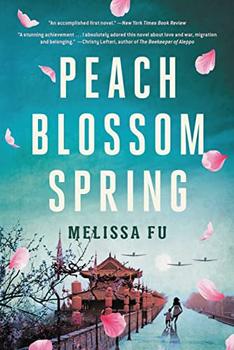Summary | Excerpt | Reading Guide | Reviews | Beyond the Book | Readalikes | Genres & Themes | Author Bio

A Novel
by Melissa Fu
Xiaowen's son is called Dao Renshu – renshu meaning benevolence, kindness, not renshu meaning to concede, to admit defeat. Dao Hongtse makes sure his grandson knows the difference. Renshu is Hongtse's only grandchild who is the son of a son. The boy carries the family name. Above all, he must be protected.
It is a late afternoon in early spring. The air tingles with freshness, shaking off the last chill of winter and hinting at blossoms to come. Tiny leaves are opening on the trees, and each day the sun offers a bit more light. Inside Dao Hongtse's kerosene shop, the wooden floorboards are swept clean, the counter is clear. Dao Hongtse can be seen speaking to a young woman who wears a simple, dark green tunic. Her hair is pulled back in a bun. Though it is clear he is her superior, both in age and position, there is an air of mutual respect. Their relaxed postures suggest familiarity, even affection. He delivers news that illuminates her face. Although she doesn't embrace him, her elation is clear.
Then he hands her a small silk bag and says something as she looks inside. She listens carefully, then responds. He considers her answer before replying. They nod in agreement. She offers a half-bow and turns to leave the room.
A light goes on in the room above the kerosene shop.
Soon, the profile of the woman can be seen in the upstairs window.
Shui Meilin records the new inventory in her ledgers, her slim, quick fingers working the abacus. Lately, many of her father-in-law's customers have been trading gold and jade for kerosene. Everywhere, cash is scarce and prices have been rising. Dao Hongtse instructed that these particular jewels are to be put in hock. The tearful customer who traded them for a week's supply of fuel pleaded with Old Dao not to sell them to anyone else, hoping to soon be able to buy back his heirlooms. Both Meilin and Hongtse were perturbed by this deal, yet another sign of the encroaching war with the Japanese, but Hongtse accepted the treasures for payment, of course. He is, after all, a businessman.
Meilin rises to put the valuables away, moving through the room as if by memory. After closing and locking the glass display cabinet, she looks out the window. The sun is setting, her work is done for the day, and she feels hopeful. Dao Hongtse has just told her of the Chinese army's triumph at Taierzhuang. Both Dao Hongtse's sons are expected home soon, given leave after a bloody but victorious rotation.
Meilin last saw her husband, Dao Xiaowen, and his brother Longwei nine months ago. After the Luguoqiao incident up north, the brothers had left home to join the fight. Meilin and her sister-in-law, Xue Wenling, had been proud their husbands were protecting the future of the Republic. The family awaited news from the faraway frontline, but weeks passed, then months, and none came. Though disappointing, this was understandable; the post was sporadic and troops were constantly on the move.
Yet waves from the war began to push into the city of Changsha. At first it was just a trickle: hotels and guesthouses filled with wealthier people retreating from the turbulent east. Wenling remarked that at least she could see the Shanghai styles sooner. Then more refugees arrived. Shops were busier than ever, as disrupted supply lines along the rivers and railways drove prices up. The streets and markets clamoured with rallies against the Japanese aggressors. But despite these gallant displays of patriotism, the Japanese advance continued. It wasn't long before Shanghai fell, and by December, the Imperial Japanese Army had overtaken Nanjing. With Chiang Kai-shek's Nationalist government relocated to nearby Wuhan, a steady stream of evacuees is now pouring into Changsha.
Hongtse's news of the victory at Taierzhuang is most welcome. The resistance was strong, the Japanese were humiliated. This, everyone is certain, will be a turning point. Best of all, Meilin can count on one hand the days until she will be able to hold her dear Xiaowen again.
Excerpted from Peach Blossom Spring by Melissa Fu. Copyright © 2022 by Melissa Fu. Excerpted by permission of Little Brown & Company. All rights reserved. No part of this excerpt may be reproduced or reprinted without permission in writing from the publisher.
Dictators ride to and fro on tigers from which they dare not dismount. And the tigers are getting hungry.
Click Here to find out who said this, as well as discovering other famous literary quotes!
Your guide toexceptional books
BookBrowse seeks out and recommends the best in contemporary fiction and nonfiction—books that not only engage and entertain but also deepen our understanding of ourselves and the world around us.